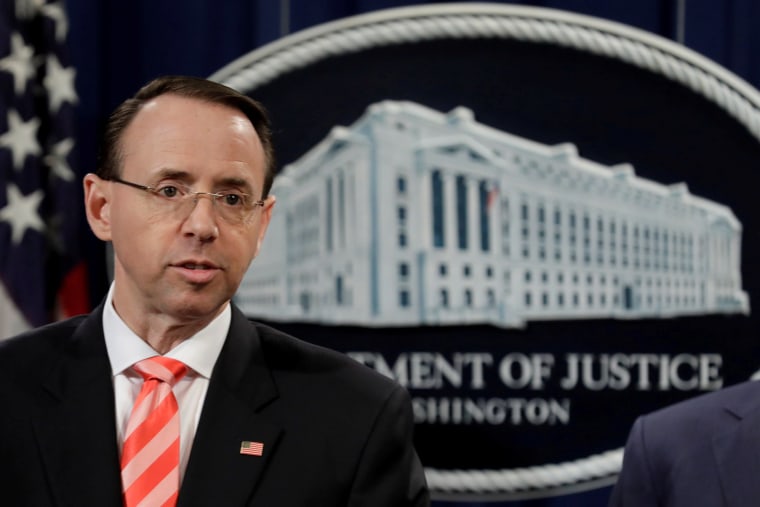Donald Trump is scheduled to participate in a one-on-one summit with Russian President Vladimir Putin in three days. In theory, the American leader should be eager to discuss an important new indictment with his foreign counterpart.
Twelve Russian intelligence officers have been indicted in connection with hacking of the Democratic National Committee and the Hillary Clinton campaign and the release of stolen emails through Guccifer 2.0 and DC Leaks to "interfere in the 2016 election," officials announced Friday. [...][Special Counsel Robert] Mueller, who has been investigating Russian interference in the 2016 election and possible collusion by the Trump campaign for months, alleged the 12 defendants in Friday's indictment are members of GRU, Russia's military intelligence agency.
The full, 29-page indictment is online here (pdf). In announcing the charges, Deputy Attorney General Rod Rosenstein told reporters this afternoon that he briefed Trump on the allegations earlier this week.
It raises the awkward possibility that when the president told reporters he believed his meeting with Putin would be "easier" than the NATO summit and his visit to the United Kingdom, Trump was already aware of the pending criminal charges against 12 Russian intelligence officers accused of attacking an American election.
There's a lot to chew on here, but here are some initial takeaways to keep in mind:
* On pages 7 and 8, the indictment notes that on July 27, 2016, the alleged attackers targeted "for the first time email accounts at a domain hosted by a third-party provider and used by [Hillary] Clinton's personal office. At or around the same time, they also targeted 76 email addresses at the domain for the Clinton campaign." This stands out for one reason: it was on July 27, 2016, that Donald Trump publicly urged Russia to help his candidacy.
* On pages 15 and 16 of the indictment, Mueller alleges that an unnamed congressional candidate specifically requested information stolen by the Russians. If we find out who that candidate is -- and whether he or she is currently a member of Congress -- I can't wait to hear his or her explanation.
* On page 17, the indictment adds that the alleged attackers communicated in 2016 with an unnamed person "who was in regular contact with senior members" of the Trump campaign.
* On pages 25 and 26, the indictment alleges that the Russian conspirators "hacked the website of a state board of elections and stole information related to approximately 500,000 voters, including names, addresses, partial social security numbers, dates of birth, and driver's license numbers." It went on to say they also "hacked into the computers of a U.S. vendor that supplied software used to verify voter registration information for the 2016 U.S. elections."
* Senate Minority Leader Chuck Schumer (D-N.Y.) this afternoon urged the president to cancel his summit with Putin in light of the new criminal allegations.
* As recently as a few hours ago, Trump, speaking from the U.K., called the investigation into the Russia scandal a "rigged witch hunt."
* If my math is right, the new total of individuals indicted by the special counsel's team is 32 people and three businesses -- which suggests this really isn't a witch hunt.
